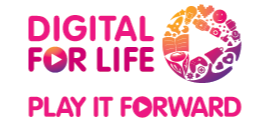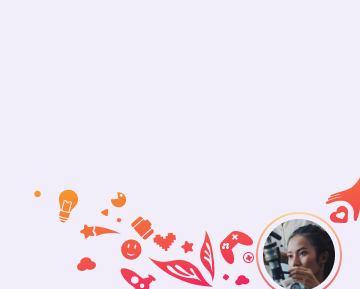Being part of Cognizant, an organisation that supports the Global 2,000 with digital services across the front, middle and back office operations, means that Amit Shanker, the Vice President & Head of Delivery, ASEAN and Guat Ling Ang, Client Partner, have front-row seats to witness the power of technology.
As they experience the transformative potential tech brings to businesses and observe how the pandemic has accelerated the adoption of digital technologies, one thing is clear: “To thrive in the future of work, tech skills are really important, and today, any profession, skill or job, whether in an insurance company or a retail company, will require digital skills,” Amit, emphasises.
To support inclusion in tech, the team at Cognizant is now on a quest to improve everyday life for all by increasing the awareness, engagement and adoption of digital tools.

Cognizant with community partners advocating for Digital Inclusion at “Cognizant Community Café” (photo was taken during the pre-COVID period).
Staying cognizant about what communities need
“It is our responsibility to prepare communities for digitalisation,” Amit declares, adding that for years, Cognizant has been engaging students through a range of programmes that impart different tech skills, introducing them to possible careers in tech, and enabling them to network with industry professionals.
Besides students, Cognizant also supports persons with disabilities and has been working closely with the Infocomm Media Development Authority (IMDA) to reach seniors through various programmes under the Digital Inclusion initiative.
“The government can roll out many digital services to citizens, but at the end of the day, you need to make sure there is adoption,” Guat Ling explains of Cognizant’s efforts.
To increase the adoption of these services, Cognizant provides one-on-one digital literacy coaching to help seniors use their smartphones for transactions, information, communication, entertainment and more. To date, it’s estimated that by partnering with IMDA and other social service agencies, Cognizant has boosted the digital literacy skills of more than 1,500 seniors.

Cognizant volunteers at IMDA physical digital clinics for seniors (photo was taken pre-COVID).
However, they are adamant that more can be done. For example, when the pandemic reared its head and pushed the world into work-from-home and home-based learning. “We realised that there is a group of people who may not be doing tech-related work, but for whom technology has suddenly become important”, Amit says. “They were really struggling to catch up.”
To support this demographic, the team pushed forward with a new training model called the Digital Skills Mentoring for Women.
Empowering the daughters of tomorrow
The Digital Skills Mentoring for Women is a partnership with charity organisation, Daughters of Tomorrow. It offers women from low-income backgrounds eight weeks of one-to-one virtual mentoring so they can pick up relevant digital skills, improve digital confidence and in turn, upgrade their jobs or improve their current job performance.
What differentiates Digital Skills Mentoring for Women from other training initiatives is that it is entirely customised to meet each mentee’s unique needs, Guat Ling shares.

Programme mentors (above) customise the training to fit their mentee's personal skill levels and time availability. This one-to-one approach focuses on quality over quantity for results.
She explains that mentors start with an individual assessment of each mentee’s current digital skills. From there, they determine the skills each woman needs to reach their short-term job requirements and long-term career goals. With this information, mentors can tailor a programme to meet these needs. There is also no fixed schedule, so mentors and mentees can flexibly arrange sessions at different times to suit the best.
This new format has been well-received, and 14 women successfully “graduated” at the end of the first official run in 2021. All participants reported an improvement in their confidence and prowess using MS Office, Google Workspace, as well as in file management and email etiquette. The second run in October 2021 was equally well-subscribed with 15 participants.
Offering the right help at the right time
Although Amit acknowledges that the nature of one-to-one mentoring means the initiative is more difficult to scale, he notes that the focus on quality over quantity has its advantages.
For one thing, the more intimate setting makes mentees more comfortable speaking up about their challenges and difficulties, which in turn, allows mentors to target their intervention accordingly.
For example, when Guat Ling observed that a major challenge her mentee faced was connecting to Wi-Fi, she quickly adapted and shifted their sessions to phone calls instead of video conferencing. In another instance, upon realising that her mentee struggled to remember the lessons they had, another volunteer began making instructional YouTube videos for her to refer to when she wanted to practice.
But the most memorable to date, Guat Ling shares, is of one volunteer who realised the biggest obstacle in the mentee’s way was not the lack of skill, but the confidence to apply for jobs. The mentor pivoted the sessions to focus on building courage and interview readiness—which ultimately contributed to the mentee applying for and receiving two job offers.
Inclusion requires a new understanding of progress
These benefits to mentees only reinforce the importance of humanising technology, Amit says. He explains that this is important because while topics like Artificial Intelligence (AI), machine learning, Web 3.0 or blockchain are trending, they are also extremely complex and likely overwhelming to the average person.
“Not everyone needs to know these things,” he says. “What’s most important is to humanise technology so that it is relevant to them in their day-to-day work.”
For those keen on supporting inclusion in tech, Amit encourages viewing digital progress as a personal journey. If everyone’s digital skills were ranked on a scale of one to 10, the goal would not be to insist that everyone reaches a level of 10, but to “move people from a one to a two, or a two to a three”.
Programmes such as the Digital Skills Mentoring for Women are one way to do that. However, for these programmes to find scale, the need is for more individuals and organisations to step in and help.
“Thankfully, we have a large team in Singapore and are able to do quite a bit,” Amit says, adding: “But if other companies joined forces, I believe we would really have a force multiplier effect.”
That said, are there prerequisites one must first fulfil?
“The only thing we are looking for is the passion and the ability to devote time,” Amit states. “I’d advise people to not overthink it, but to step forward because things will follow. IMDA is here, SG Digital Office (SDO) is here—and there are plenty of organisations ready to support your initiatives if you step up.”
Do you have a passion for helping foster digital inclusivity?
Cognizant offers training to organisations keen to step up as digital mentors for Social Service Agencies (SSAs) and their beneficiaries. So what are you waiting for? Partner with Cognizant, and you can do your part for beneficiaries under the Digital Skills Mentoring Programme.
The Digital Skills Mentoring for Women is one of the many Digital for Life (DfL) projects supported by IMDA. Find out more about the projects available, how you can contribute, or start one of your own!


